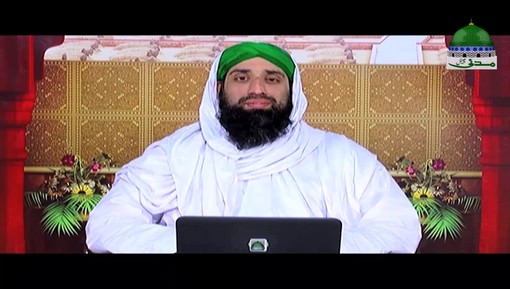Pious women of Islam
Sayyidatuna Zainab Bint-e-Abu Salamah رَضِیَ الـلّٰـهُ عَنْھُمَا
Muhammad Bilal Sa’eed Attari Madani
One fortunate woman to remain under the upbringing of the Holy Prophet صَلَّى الـلّٰـهُ عَلَيْهِ وَاٰلِهٖ وَسَلَّم and to attain a major share from his special blessings is ‘Sayyidatuna Zainab Bint-e-Abu Salamah رَضِیَ الـلّٰـهُ عَنْھُمَا’. She رَضِیَ الـلّٰـهُ عَنْهَا had the honour of being the step daughter of the Holy Prophet صَلَّى الـلّٰـهُ عَلَيْهِ وَاٰلِهٖ وَسَلَّم.
In the year 4 AH, when Sayyiduna Abu Salamah رَضِىَ الـلّٰـهُ عَـنْهُ passed away, the Holy Prophet صَلَّى الـلّٰـهُ عَلَيْهِ وَاٰلِهٖ وَسَلَّم married Sayyidatuna Umm-e-Salamah رَضِیَ الـلّٰـهُ عَنْهَا.
Sayyidatuna Zainab رَضِیَ الـلّٰـهُ عَنْهَا, along with her mother, came under the guardianship of the Holy Prophet صَلَّى الـلّٰـهُ عَلَيْهِ وَاٰلِهٖ وَسَلَّم and stayed under his blessed upbringing.
Sayyidatuna Zainab رَضِیَ الـلّٰـهُ عَنْهَا was born in Habshah [Abyssinia], and then migrated with her blessed mother to Madinah-tul-Munawwarah. She رَضِیَ الـلّٰـهُ عَنْهَا belonged to the tribe of Banu Makhzoom. (Usd-ul-Ghaabah, vol. 7, p. 145)
How she رَضِیَ الـلّٰـهُ عَنْهَا attained the name ‘Zainab’?
Sayyidatuna Zainab Bint-e-Abu Salamah رَضِیَ الـلّٰـهُ عَنْھُمَا said: ‘My name was kept ‘Barrah’ (Meaning extremely pious). The Holy Prophet صَلَّى الـلّٰـهُ عَلَيْهِ وَاٰلِهٖ وَسَلَّم said, ‘Do not declare your piety, Allah Almighty knows fully who is more pious out of you. Keep the name ‘Zainab’.’ (Muslim, p. 911, Hadees 5609, selected)
The affection the Holy Prophet صَلَّى الـلّٰـهُ عَلَيْهِ وَاٰلِهٖ وَسَلَّم bestowed upon her
The Holy Prophet صَلَّى الـلّٰـهُ عَلَيْهِ وَاٰلِهٖ وَسَلَّم was extremely affectionate towards Sayyidatuna Zainab Bint-e-Abu Salamah رَضِیَ الـلّٰـهُ عَنْهَا. Once, the Holy Prophet صَلَّى الـلّٰـهُ عَلَيْهِ وَاٰلِهٖ وَسَلَّم sprinkled water on her face. Through the blessings of that water, signs of youth remained apparent on her blessed face even in the old age. (Istee’aab, vol. 4, p. 411)
Married life
Sayyidatuna Zainab Bint-e-Abu Salamah رَضِیَ الـلّٰـهُ عَنْھُمَا was married to Sayyiduna ‘Abdullah Bin Zam’ah رَضِىَ الـلّٰـهُ عَـنْهُ. From this blessed marriage, they had 6 sons and 3 daughters. (Tabqat Ibn-e-Sa’d, vol. 8, p. 337)
Remarkable patience
When the people of Madinah were being martyred on the occasion of Yaum-ul-Harrah, among them were also two sons of Sayyidatuna Zainab Bint-e-Abu Salamah رَضِیَ الـلّٰـهُ عَنْهَا. When their bodies were brought to her, she رَضِیَ الـلّٰـهُ عَنْهَا observed immense patience, read ‘اِنَّا لِلهِ وَ اِنَّآ اِلَیْهِ رٰجِعُوْنَ’ and did not mourn. (Istee’aab, vol. 4, p. 411)
Women should especially learn a lesson from this account. Remember! To slap yourself or do anything that demonstrates impatience at the death of your relative is called ‘Nohah’ [i.e. mourning], and the one who does this is a great sinner. If one sheds tears or makes a normal sound at this time and also utters a few words of patience, then there is no harm in it. (Islami Zindagi, p. 117)
Academic awe
Sayyidatuna Zainab Bint-e-Abu Salamah’s رَضِیَ الـلّٰـهُ عَنْھُمَا expertise in Islamic jurisprudence was matchless and her graceful excellence was second to none. Women would consult her for the matters of Shari’ah. Sayyidatuna Zainab Bint-e-Abu Salamah رَضِیَ الـلّٰـهُ عَنْھُمَا also narrated a few Ahadees of the Beloved Prophet صَلَّى الـلّٰـهُ عَلَيْهِ وَاٰلِهٖ وَسَلَّم. (Asabah, vol. 8, p. 160, summarised)
Her passing
She رَضِیَ الـلّٰـهُ عَنْهَا passed away after the event of ‘Harrah’. (Akmal fi Asma’-ur-Rijaal, p. 596) She رَضِیَ الـلّٰـهُ عَنْهَا was buried in Jannat-ul-Baqi’. (Tabqat Ibn-e-Sa’d, vol. 8, p. 337)















Comments